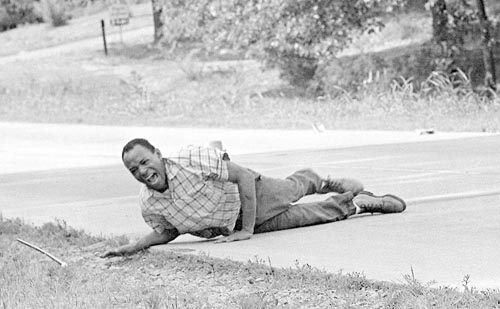
Civil rights activist James Meredith grimaces in pain as he pulls himself across Highway 51 in Hernando, Miss. after being shot during a voting rights march, June 6, 1966., a photo by Pan-African News Wire File Photos on Flickr.
Scalia is winner in Supreme Court voting rights ruling
By Robin Abcarian
June 25, 2013, 3:10 p.m
Los Angeles Times
.
I have read that there were gasps in the Supreme Court during arguments last February when Justice Antonin Scalia described the 1965 Voting Rights Act, one of the great achievements of the Civil Rights era, as a “racial entitlement.”
At the time, Scalia was questioning the motives of Congress, which had overwhelmingly voted to extend the act in 2006.
“And this last enactment,” said Scalia, “not a single vote in the Senate against it. And the House is pretty much the same. Now, I don’t think that’s attributable to the fact that it is so much clearer now that we need this. I think it is attributable—very likely attributable—to a phenomenon that is called ‘perpetuation of racial entitlement.’ Whenever a society adopts racial entitlements, it is very difficult to get out of them through the normal political process.”
As my colleague David Horsey pointed out at the time, voting is not a racial entitlement, it’s an American entitlement.
Still, Scalia’s attitude was reflected in today’s 5-4 decision gutting the Voting Rights Act. Justices tossed the section that requires states with a history of voter discrimination to get federal approval before making changes in their voting laws.
The criteria used to determine whether discrimination had occurred is outdated, said Chief Justice John G. Roberts Jr. “The Act imposes current burdens and must be justified by current needs.”
Congress, of course, can update those criteria, but no one expects that gridlocked group to rise to the occasion.
Having just covered the last presidential election, which was rife with conflicts over attempts to suppress voter turnout in minority areas by limiting early voting, by imposing onerous demands for identification, by misinforming voters about which day was election day, I can tell you, attempts at voter suppression are as American as apple pie. Or unmanned drone strikes.
A small silver lining here, though. Roberts also noted, “At the same time, voting discrimination still exists; no one doubts that.”
I am grateful he acknowledged the ongoing struggle. But he’s wrong on that second point. Plenty of people doubt that voting discrimination still exists.
Many conservatives alarmed at the high turnout among black voters in the last two presidential elections and the increasing registration of other minorities have claimed there is no systematic voter discrimination or suppression. Or if any exists, they say, it goes both ways.
They offer up the case of the New Black Panthers, a 2008 incident where four black men, one of whom held a baton, were said to have intimidated voters outside a Philadelphia polling place. The case--whatever your feelings about what took place and how authorities handled it--was not evidence of widespread, systematic voter discrimination of the sort addressed by the Voting Rights Act, and currently practiced in places like Texas and Arizona.
As soon as the court made its decision public today, the attorney general of Texas, one of nine mostly Southern states targeted by the act, announced the state’s voter ID law, which had been on hold, will take effect immediately. That law requires that photo identification be shown.
The attorney general also said that a 2011 redistricting plan, blocked by federal judges who said it intentionally discriminates against minorities, will also take effect right away.
In a 2012 story about the Texas redistricting fight, the New York Times noted this gem of an argument:
“Minority groups and Democratic lawmakers sued the state in federal court over the maps drawn by the Republican-controlled Legislature, arguing that they discriminated against blacks and Hispanics. Lawyers for Greg Abbott, the Texas attorney general, who is representing the state, have argued that the maps were drawn to help Republicans maintain power, not to discriminate.”
OK, well, hmmm. Let’s see. What race are Republican voters in Texas, in the main? Which party do blacks and Latinos overwhelmingly identify with?
Yeah, that’s what I thought.
No comments:
Post a Comment